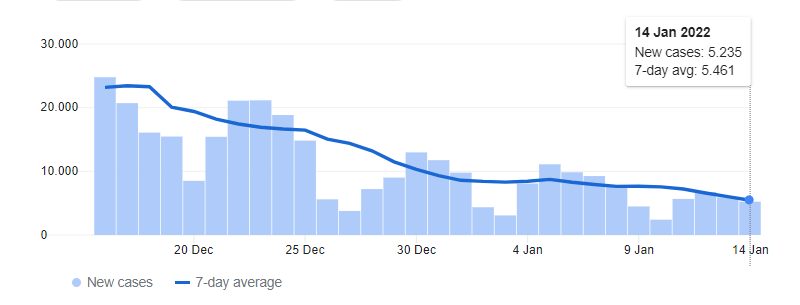Saturday 15 January 2022 2:35 pm

Covid scientist are increasingly convinced the Omicron variant is acting as a natural vaccine for tens of millions of people around the world as most infected people have no or very mild symptoms, yet their bodies do produce full antibodies.
Many countries are currently seeing record numbers of infections, including the UK, US, most of Europe and Asia, but hospital admissions only show a modest or even no serious increase.
In South Africa, where Omicron was first detected in November, infection rates are dropping rapidly and most experts believe the Omicron wave has passed and other countries should expect the same cycle in the next few months.
The high level of contagiousness, paired with very mild symptoms, may make Omicron a blessing in disguise, some Covid scientists argue. In fact, some go as far by suggesting there may no need to get vaccinated anymore, just get Omicron.
Dr Vishal Sehgal, president of medical services at Portea MeMedical in India, told the Times of India that “Omicron acts as a natural vaccine and proves beneficial as it is less life-threatening.”
Tail end of the pandemic?
A number of experts around the world are convinced the world is currently seeing the tail of the pandemic, based on other virus outbreaks in history.
Dr Namita Jaggi of Artemis Hospitals in India told various media outlets that “pandemics have traditionally speaking petered out by having variants that are milder and less severe till they finally die out.”
“So no, Omicron is not a cause of concern, rather we must optimistically hope that we are moving towards the end of the pandemic,” Jaggi said.
‘We are moving towards the end of the pandemic’
Dr Namita Jaggi
Nicanor Austriaco, a Filipino-American molecular biologist, also believes Covid may slowly be killing itself off with the milder Omicron variant.
During a Town Hall meeting, last week, he said that those infected with Omicron will have antibodies that “will protect them against Delta, Gamma, Beta, Alpha and D614G” variants.
“This variant is the beginning of the end of the pandemic that has crippled the global community for two years already,” Austriaco told The PhilStar newspaper last week.

“As the virus rapidly increases, it’s going to try to spread to everyone and it’s going to try to find as many of our vulnerable. It is spreading so rapidly, what you will expect it will run out the ‘food’ soon.”
“And when it runs out of food, it will begin to crash, which is what you see in South Africa, the numbers are crashing.
“In London, the numbers are beginning to fall only because it spreads like wildfire, and when all the trees are burned, there’s nowhere for it to go. So it begins to crash.”
Nicanor Austriaco – molecular biologist
“We have to realize that Omicron is the beginning of the end of the pandemic because Omicron is going to provide the kind of population immunity that should stabilize our societies and should allow us to reopen,” Austriaco added.
In addition to that, pulmonologist Dr Puneet Khanna said that “viruses tend to evolve towards a less severe strain that can be easily transmitted but is less fatal.”
“Making humans very sick is not in the interest of the virus.”
Dr Puneet Khanna
“Thus, there is hope that in the future, the strain will turn weaker and cause a mild infection quite similar to common flu. But it has to be remembered tthat viruses keep on mutating and so later versions may get even dangerous mutations or become even milder,” Khanna told the Times of India.
Path out of Omicron
The latest figures in South Africa and a number of other countries, may offer the rest of the world a way out of Omicron, argued Salim Abdool Karim, one of South Afrcia’s most important infectious-diseases scientists.
He is convinced that “every other country, or almost every other, will follow the same trajectory.” The rate of new infections has consistenly dropped over the last 30 days.

Karim, who has led the pandemic response in South Africa, also told various media the peak of the Omicron wave has passed, comparing the wave of cases to Africa’s highest mountain.
“If previous variants caused waves shaped like Kilimanjaro, omicron’s is more like we were scaling the North Face of Everest,” Karim said, referring to the near-vertical jump in infections that South Africa experienced during the final weeks of November and first two weeks of December.
His peer, the chairwoman of the South African Medical Association, Dr. Angelique Coetzee, a household name in South Africa, could not agree more: the country is “over the curve and [infection] numbers are much lower,” she said.
Looking at the data coming out of Southern Africa and the UK, Marc van Ranst, a Belgian professor of virology at Leuven University and the Rega Institute for Medical Research. said that “the omicron variant is less pathogenic but with greater infectivity, allowing Omicron to replace Delta, this is very positive.”
“It is extremely important we need to closely monitor the clinical data of Omicron patients in South Africa and worldwide,” Van Ranst stressed.
Finally, another well-known virologist in Africa, Michelle Groome, of the National Institute of Communicable Diseases (NICD), equally told multiple news outlets that “we have surpassed the peak of infections.”
Groome cited figures from the NCID showed that new cases dropped by nearly a quarter over the past seven days, following another 14 per cent drop the previous week.
There are currently no restrictions in South Africa. Restaurants, shops, cinemas, malls, bars, coffee shops and gyms are all open, both indoors as well as outdoors.
Most transmissible variant
Despite reasons to be cautiously optimistic, physician Leonard Pascual did warn that “Omicron is the most contagious variant yet of the Covid-19 virus. Don’t let anyone win you over with the narrative that is a cure-all, end-all, ‘vaccine.’ It’s still Covid.”
In fact, only “a whiff of infected breath” is enough to catch the most transmissible variant of coronavirus, a leading scientist warned earlier last week.
Professor Peter Openshaw, who sits on the UK’s New and Emerging Respiratory Virus Threats Advisory Group (Nervtag), stressed how infectious Omicron is.
“We’ve had several iterations of this virus going through different stages of its evolution,” he said.
“We’re lucky really that it wasn’t this infectious when it first moved into human-to-human transmission.”
Professor Peter Openshaw
To prevent new variants from emerging or prevent variants like Delta or Omicron from further adaptation, “take away the virus’ opportunity to replicate,” Canada-based Dr. Angela Rasmussen wrote last week.
“That means stop transmission to new hosts. Fewer new cases = less replication = less mutation = fewer variants emerging. So, as the article says, we need to reduce community transmission, increase surveillance and test/trace capacity, and address this while still rare,” she warned.